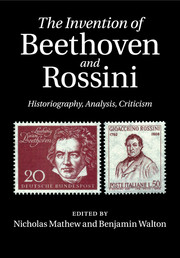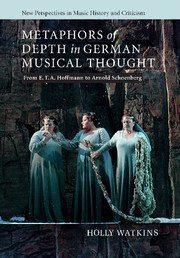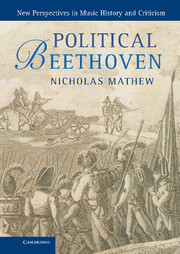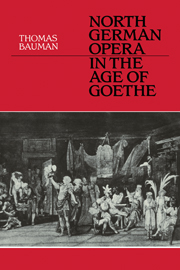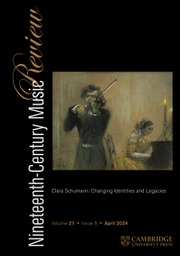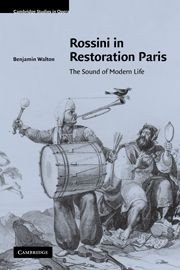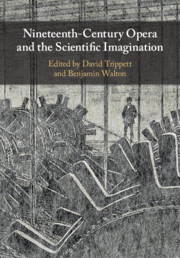The Invention of Beethoven and Rossini
Historiography, Analysis, Criticism
$34.99 ( ) USD
- Editors:
- Nicholas Mathew, University of California, Berkeley
- Benjamin Walton, University of Cambridge
- Date Published: No date available
- availability: This ISBN is for an eBook version which is distributed on our behalf by a third party.
- format: Adobe eBook Reader
- isbn: 9781107595705
Find out more about Cambridge eBooks
$
34.99 USD
( )
Adobe eBook Reader
Other available formats:
Hardback, Paperback
Looking for an examination copy?
This title is not currently available for examination. However, if you are interested in the title for your course we can consider offering an examination copy. To register your interest please contact [email protected] providing details of the course you are teaching.
-
Beethoven and Rossini have always been more than a pair of famous composers. Even during their lifetimes, they were well on the way to becoming 'Beethoven and Rossini' – a symbolic duo, who represented a contrast fundamental to Western music. This contrast was to shape the composition, performance, reception and historiography of music throughout the nineteenth and twentieth centuries. The Invention of Beethoven and Rossini puts leading scholars of opera and instrumental music into dialogue with each other, with the aim of unpicking the origins, consequences and fallacies of the opposition between the two composers and what they came to represent. In fifteen chapters, contributors explore topics ranging from the concert lives of early nineteenth-century capitals to the mythmaking of early cinema, and from the close analysis of individual works by Beethoven and Rossini to the cultural politics of nineteenth-century music histories.
Read more- Provides the first in-depth treatment of the myriad relationships between the two central figures of early nineteenth-century music
- Major scholars explore current thinking about some of the most important questions in music history, relevant for scholars and students of music and culture from the eighteenth century until the present day
- Incorporates a wide range of scholarly perspectives, from music analysis to reception history and critical theory
Customer reviews
17th Oct 2024 by UName-224265
I am really fasinatied by this book because it gives me insights into the virtuosity and virtuoso.
Review was not posted due to profanity
×Product details
- format: Adobe eBook Reader
- isbn: 9781107595705
- contains: 14 b/w illus. 34 music examples
- availability: This ISBN is for an eBook version which is distributed on our behalf by a third party.
Table of Contents
Introduction: pleasure in history Nicholas Mathew and Benjamin Walton
Part I. The Age of Beethoven and Rossini?:
1. Dahlhaus's Beethoven-Rossini Stildualismus: lingering legacies of the text event dichotomy James Hepokoski
2. Beethoven, Rossini - and others James Webster
3. Heilige Trias, Stildualismus, Beethoven: the limits of nineteenth-century Germanic music historiography Gundula Kreuzer
4. Rossini and Beethoven in the reception of Schubert Suzannah Clark
Part II. Senses of Place:
5. Two styles in 1830s London: 'the form and order of a perspicuous unity' Roger Parker
6. Looking north: Carlo Soliva and the two styles south of the Alps Martin Deasy
7. 'More German than Beethoven': Rossini's Zelmira and Italian style Benjamin Walton
8. On being there in 1824 Nicholas Mathew
Part III. Rehearings:
9. Making overtures Scott Burnham
10. Beethoven dances: Prometheus and his creatures in Vienna and Milan Mary Ann Smart
11. Rossinian repetitions Emanuele Senici
Part IV. Crossing Musical Cultures:
12. Very much of this world: Beethoven, Rossini and the historiography of modernity Julian Johnson
13. Schopenhauer and Rossinian universality: on the Italianate in Schopenhauer's metaphysics of music Yael Braunschweig
14. Elements of disorder: appealing Beethoven vs Rossini John Deathridge
15. Role reversal: Rossini and Beethoven in early biopics Richard Will.
Sorry, this resource is locked
Please register or sign in to request access. If you are having problems accessing these resources please email [email protected]
Register Sign in» Proceed
You are now leaving the Cambridge University Press website. Your eBook purchase and download will be completed by our partner www.ebooks.com. Please see the permission section of the www.ebooks.com catalogue page for details of the print & copy limits on our eBooks.
Continue ×Are you sure you want to delete your account?
This cannot be undone.
Thank you for your feedback which will help us improve our service.
If you requested a response, we will make sure to get back to you shortly.
×
